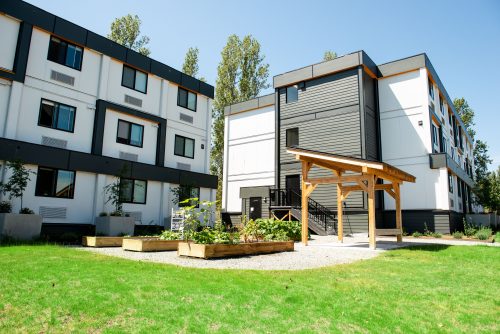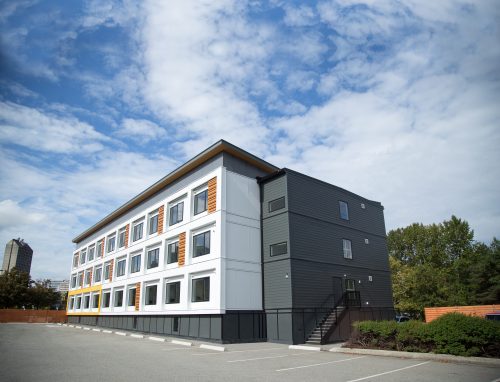
The City of Toronto is increasing the supply of new affordable housing across Toronto. As part of the HousingTO 2020-2030 Action Plan, the City committed to create 1,000 new modular homes in Toronto. The Modular Housing Initiative is an innovative way to build small-scale infill housing that provides people experiencing homelessness with safe homes and appropriate supports to help them achieve housing stability.
Modular housing, which is essentially prefabricated housing, is built off-site in a factory and transported to the site for assembly. City Council approved the construction of the first 250 modular homes on City-owned sites in 2020 and 2021. Since then, the City has completed 216 modular homes.
Four modular buildings have already been completed. These buildings are providing 216 homes with 24/7 support services provided on-site for people who have experienced or were at risk of homelessness:
One modular project is currently under development:

78 pet-friendly homes featuring a community kitchen and nutrition assistance, as well as opportunities for training and employment for residents.

52 studio homes in a modular building featuring a community garden and housing-embedded services such as peer employment programs that provide sustainable opportunities for residents to form and join community.
Vancouver’s first temporary modular housing project providing 40 social housing units to lower-income residents, including units designed to accommodate persons with accessibility requirements.
A one three-storey building containing 58 studio homes, primarily for single adults. All units are self-contained dwellings with a private bathroom and kitchen. Six units are wheelchair accessible.
Supportive housing is a combination of deeply affordable housing and on-site supports that enable people to live as independently as possible. Supportive housing can help people stabilize their lives, help them stay housed and positively contribute to communities. Learn more about supportive housing.
City officials have reviewed City-owned sites across Toronto. Modular housing sites are selected based on demand for affordable housing, environmental condition and development potential, access to public transit, access to health and other community services, Official Plan and Zoning By-law considerations and site servicing.
City Planning and Urban Design staff work with project architects to ensure that the proposed buildings fit into their respective neighbourhoods. The selected building materials and colour palette aim to help the building fit in to the local context in Toronto. The neutral colour palette, mix of textures, architectural features and use of wood on the exterior all help to create a building that is more refined and stands the test of time.
Along with the modular housing buildings, projects include a detailed landscape design with the goal of helping the project fit in with the area through extensive plantings of trees and shrubs, as well as protecting privacy for adjacent properties.
NRB Modular Solutions (formerly Horizon North), part of Dexterra Group, is the successful proponent of the RFP to manufacture the modular buildings for the City’s Modular Housing Initiative (MHI), Phase Two. NRB Modular Solutions is based in Grimsby Ontario.
A request for Supplier Qualifications (RFSQ) was released on August 14, 2020 and closed on September 25, 2020.This allowed CreateTO and the City to shortlist potential, qualified modular manufacturers. A full Request for Proposals (RFP) was issued for the second phase of the Modular Housing Initiative on November 10, 2020 and closed on December 4, 2020. Based on this process the City selected NRB Modular Solutions.
NRB Modular Solutions is the same company that manufactured the modular buildings for the City of Toronto’s MHI Phase One. For Phase One, the terms of the proposed single source contract were reviewed and considered by Toronto City Council on April 30 2020.
The City selects qualified and experienced non-profit housing providers to manage the properties and provide support services for residents. The City continues to work with the selected housing providers after new residents will move in.
The City allocates housing subsidies to these modular units to ensure these homes are affordable to future residents. Additionally, the City, as part of its selection process, selects non-profit organizations that can demonstrate they are financially sound and viable, have sufficient operating funding to provide support services and have the experience and capability to successfully operate the project, including the provision of supports.
These modular homes are created for people currently experiencing homelessness. Future tenants will be identified and referred through the City’s Coordinated Access processes and people experiencing chronic homelessness will be prioritized. Coordinated Access is a consistent community-wide approach to assessing, prioritizing, and connecting people experiencing homelessness to housing and supports.
Tenants for these units will be identified using a prioritization-based approach to connect people to this permanent housing opportunity. There will be no direct referrals. The City will coordinate the tenant identification process in partnership with street outreach, shelter, 24-hr respite, and hotel/motel program providers. A common assessment is used to understand the types and level of supports clients will need to maintain housing stability. The City will work with the selected non-profit housing operators to ensure tenants are connected with supports that best meet their needs. Consideration is given to the type and intensity of support and client choice in regard to their housing preferences.
All services provided on the modular sites will be for residents only to help them achieve housing stability and prevent from return to homelessness. It is expected that a range of support and health services be provided including meal services, providing or connecting residents to primary health services, community supports and services such as: education; employment; and life skills. The modular buildings will not include supervised injection sites.
No increased public safety issues in the neighbourhood are anticipated as a result of the modular housing projects. The properties are managed by experienced non-profit housing providers who are responsible for ensuring that community concerns are addressed.
A study by the Wellesley Institute interviewed tenants, staff and neighbours of two supportive housing facilities in Toronto to understand their impact on the social and economic health of immediate neighbourhoods, the attitudes of neighbours to the facilities, and how these attitudes have changed over time. The study found no evidence that the supportive housing buildings had negatively affected property values or crime rates in the neighbourhood. Property values have increased and crime decreased in the period considered by the study.
The number of people actively experiencing homelessness in Toronto continues to grow. As a result of the COVID-19 pandemic which put significant pressure on the shelter system and created even more urgency behind the need to create affordable and supportive housing, City Council directed staff to prioritize the Modular Supportive Housing Initiative including expediting the necessary building and planning approvals.
The City Planning and Toronto Building divisions, along with all other City divisions, appropriately allocated staff resources to process and review the required planning and building permit applications for the modular housing sites in a streamlined and efficient manner. City staff have been actively engaged in the pre-application review process to proactively identify, prioritize and respond to possible issues or constraints in order to identify solutions efficiently.